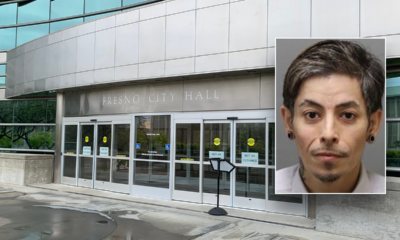California
California family reels from destructive Mountain Fire

Watch CBS News
Be the first to know
Get browser notifications for breaking news, live events, and exclusive reporting.

California
‘Not a done deal’: California vows ‘vigorous’ review of Paramount-Warner Bros takeover

Rob Bonta, California’s attorney general, said his office will investigate a possible merger between Paramount Skydance and Warner Bros Discovery, hours after Netflix backed away from a planned takeover.
“Paramount/Warner Bros is not a done deal,” Bonta said in a post on X. “These two Hollywood titans have not cleared regulatory scrutiny — the California Department of Justice has an open investigation, and we intend to be vigorous in our review.”
Any acquisition of Warner Bros would require approval from regulators in the United States and Europe, including the US justice department’s antitrust division. The deal Paramount struck for Warner is valued at nearly $111bn.
The merger poses a risk for California’s economy. Paramount’s bid is likely to raise concerns about job cuts in the state, which also dogged Netflix’s bid. Paramount sees $6bn in cost “synergies” in the deal, which typically means massive layoffs, reducing the number of suppliers, squeezing existing contractors for better terms after the two companies merge or other reductions.
The chief executive of Paramount, David Ellison, said his company was pleased the Warner Bros board had “unanimously affirmed the superior value of our offer”, which he said delivered “WBD shareholders superior value, certainty and speed to closing”. Ellison is the son of Oracle co-founder Larry Ellison, a close ally of Donald Trump.
On Friday, Warner Bros Discovery reportedly agreed to be acquired by Paramount Skydance. Reuters and Deadline reported that the deal was announced in a global town hall by the company. Paramount and Warner Bros did not immediately confirm the deal to the Guardian.
A merger between the two media giants is also facing backlash from several lawmakers. Senator Elizabeth Warren, a key voice against growing monopolies, echoed Bonta’s concerns after Netflix walked away from the deal on Thursday, and noted that Netflix CEO Ted Sarandos was seen at the White House shortly before the company said it would bow out of the deal.
“A Paramount Skydance-Warner Bros merger is an antitrust disaster threatening higher prices and fewer choices for American families,” Warren said in a statement. “What did Trump officials tell the Netflix CEO today at the White House? A handful of Trump-aligned billionaires are trying to seize control of what you watch and charge you whatever price they want.”
The senator added: “With the cloud of corruption looming over Trump’s Department of Justice, it’ll be up to the American people to speak up and state attorneys general to enforce the law.”
On Friday, Bonta responded to concerns about the merger posted by actor Mark Ruffalo.
“Please let’s circle up all the State AG’s and talk about how this is going to kill completion in the industry and drive down wages, and product quality for consumers,” Ruffalo posted.
“There are lots of agents in Hollywood who can tell you how past mergers and consolidations have hurt their clients and business. There is lots of talent that can tell you the same.”
Bonta reposted the actor’s comments, responding that he is in “conversation with my AG colleagues about Paramount/Warner Bros”.
The California department of justice did not immediately respond to a request for comment from the Guardian.
The Writers Guild of America, the union representing thousands of television and film writers along with other media workers, has said a Paramount takeover of Warner Bros would hurt jobs.
Warner Bros canceled $2bn in content after merging with Discovery in 2022, and Paramount’s recent merger with Skydance led to 1,000 layoffs, the union said in written testimony to the US Senate.
California
Amid angry backlash, serial child molester is rearrested the same day he was set to be paroled

Following major backlash about the scheduled release of a serial child molester through California’s elderly parole program, the 64-year-old is now facing new charges that could keep him behind bars.
News that David Allen Funston was set to be freed was met by outrage among victims, politicians and others. The former Sacramento County district attorney who prosecuted Funston said she was strongly opposed to his release: “This is one I’m screaming about.”
Funston, granted parole earlier this month, was set to be released on Thursday from state prison — but was rearrested that same day on new charges from a decades-old, untried case. The charges he’s facing are from a 1996 case in which he is accused of sexually assaulting a child in Roseville, according to the Placer County district attorney’s office.
In 1999, he was convicted of 16 counts of kidnapping and child molestation and had been serving three consecutive sentences of 25 years to life and one sentence of 20 years and eight months at the California Institution for Men in Chino. The sentences followed a string of cases out of Sacramento County in which prosecutors said Funston lured children under the age of 7 with candy and, in at least one case, a Barbie doll to kidnap and sexually assault them, often under the threat of violence.
He was described by a judge at his sentencing hearing as “the monster parents fear the most.”
Prosecutors in Placer County, at the time, decided not to pursue the case against Funston in Roseville given the severity of the sentences he received in Sacramento County.
But given his scheduled release from state prison, prosecutors decided to file new charges against him. Placer County Dist. Atty. Morgan Gire said “changes in state law and recent parole board failures” led to his improper release.
“This individual was previously sentenced to multiple life terms for extremely heinous crimes,” Gire said in a statement. “When changes in the law put our communities at risk, it is our duty to re-evaluate those cases and act accordingly. David Allen Funston committed very real crimes against a Placer County child, and the statute of limitations allows us to hold him accountable for those crimes.”
He is now being held without bail in the Placer County jail, booked on suspicion of lewd and lascivious acts against a child, according to prosecutors. Funston’s attorney, Maya Emig, said she had only recently learned about his arrest and hadn’t yet had time to fully review the matter.
But she noted that she believes “in the justice system and the rule of law.”
Emig called the Board of Parole Hearings’ decision to grant Funston elderly parole “lawful and just.”
California’s elderly parole program generally considers the release of prisoners who are older than 50 and have been incarcerated for at least 20 continuous years, considering whether someone poses an unreasonable risk to public safety.
In Funston’s case, commissioners said they did not believe Funston posed a significant danger because of the extensive self-help, therapy work and sex offender treatment classes he completed, as well as his detailed plan to avoid repeating his crimes, the remorse he expressed and his track record of good behavior in prison, according to a transcript from the Sept. 24 hearing.
At the hearing, Funston called himself a “selfish coward” for victimizing young children, and said he was “disgusted and ashamed of my behavior and have great remorse for the harm I caused my victims, their families in the community of Sacramento.”
“I’m truly sorry,” he said.
But victims of his crimes, as well as prosecutors and elected leaders have questioned the parole decision and called for its reversal.
“He’s one sick individual,” a victim of Funston’s violence told The Times. “What if he gets out and and tries to find his old victims and wants to kill us?”
A spokesperson for Gov. Gavin Newsom said the governor also did not agree with Funston’s release and had asked the board to review the case. However, Newsom has no authority to overturn the parole decision.
Some state lawmakers also cited Funston’s case as evidence that California’s elderly parole program needs reform, recently introducing a bill that would exclude people convicted of sexual crimes from being considered by the process.
California
Video shows skier dangling from chairlift at California ski resort

Thursday, February 26, 2026 7:21PM
BIG BEAR, Calif. — Stunning video shows a skier in Southern California hanging off a ski lift in Big Bear as two others held her by her arms.
The incident happened Tuesday. Additional details about the incident were not available.
At last check, the video had been viewed more than 13 million times on Instagram.
It appears the skier made it to the unloading area unscathed, thanks to her ski lift buddies.
Copyright © 2026 KABC Television, LLC. All rights reserved.
-

 World2 days ago
World2 days agoExclusive: DeepSeek withholds latest AI model from US chipmakers including Nvidia, sources say
-

 Massachusetts2 days ago
Massachusetts2 days agoMother and daughter injured in Taunton house explosion
-

 Montana1 week ago
Montana1 week ago2026 MHSA Montana Wrestling State Championship Brackets And Results – FloWrestling
-

 Oklahoma1 week ago
Oklahoma1 week agoWildfires rage in Oklahoma as thousands urged to evacuate a small city
-

 Louisiana5 days ago
Louisiana5 days agoWildfire near Gum Swamp Road in Livingston Parish now under control; more than 200 acres burned
-

 Denver, CO2 days ago
Denver, CO2 days ago10 acres charred, 5 injured in Thornton grass fire, evacuation orders lifted
-

 Technology6 days ago
Technology6 days agoYouTube TV billing scam emails are hitting inboxes
-

 Technology6 days ago
Technology6 days agoStellantis is in a crisis of its own making























